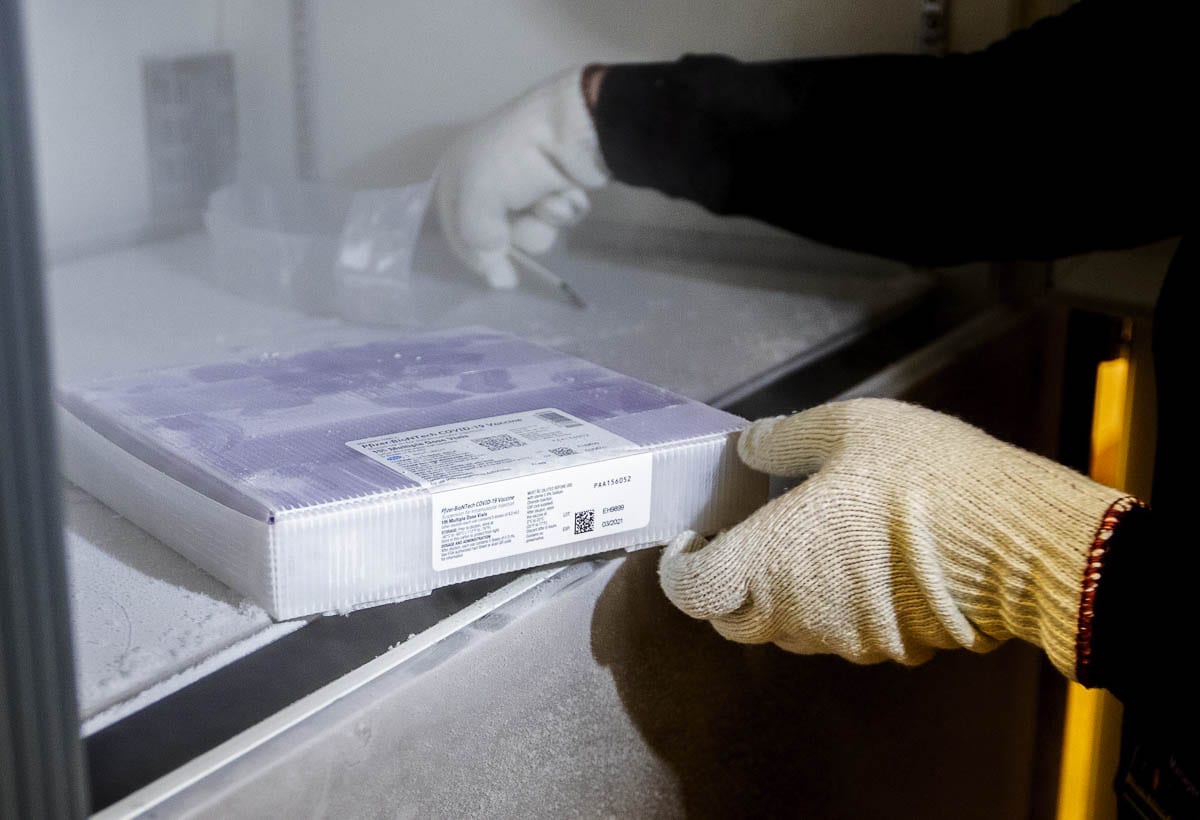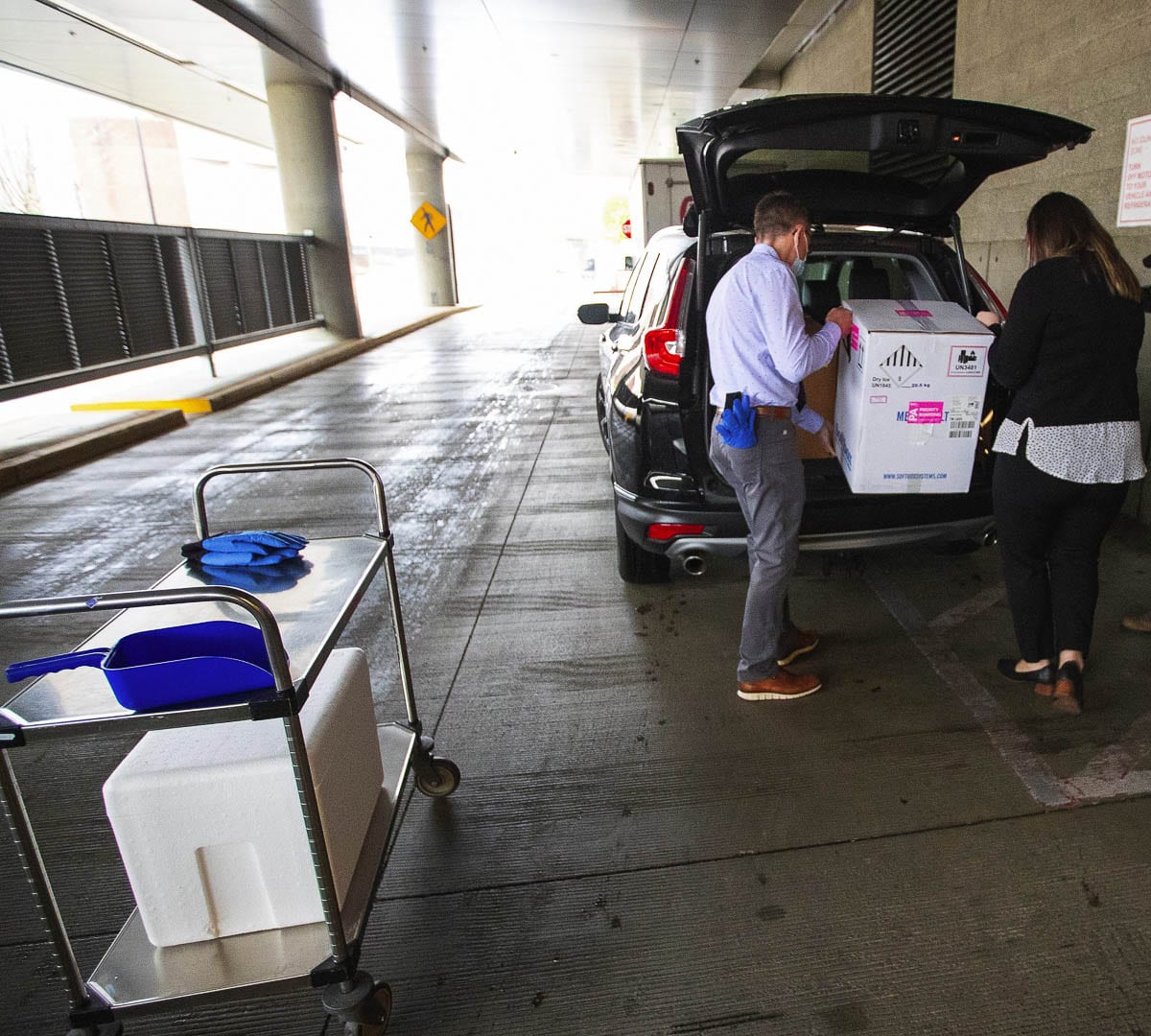Healthcare workers and first responders will be among the first in line to receive the vaccine by Pfizer-BioNTech
As of Monday morning, the first vials of COVID-19 vaccine arrived at the University of Washington Medical Center in Seattle.
Packed in dry ice, the vaccine doses were unloaded into a special refrigeration unit that can keep them at -80 degrees celsius until they’re ready for use.

PeaceHealth Southwest in Vancouver is one of only a handful of hospitals in the state with such specialized cold storage.
The initial shipments of 62,400 Pfizer-BioNTech COVID-19 vaccine doses will arrive at 17 sites in 13 counties this week, following emergency approval last week by the Food and Drug Administration, and approval over the weekend by the Western States Scientific Safety Review Workgroup over the weekend.
A total of 222,000 doses of the Pfizer vaccine are expected to arrive in Washington state by the end of the month, with regular weekly shipments beginning in January.
“This vaccine is a sign of hope that the pandemic is something we can overcome,” said Secretary of Health John Wiesman in a news release Monday morning. “We still have a long way to go to beat COVID-19, but this is the tool that will start saving lives immediately.”
The Pfizer vaccine is given in two doses, 21-days apart. Clinical trials showed it to be 95 percent effective at preventing COVID-19 infection within seven days of the second dose.
A second vaccine candidate developed by Moderna Therapeutics will be reviewed by the FDA on Dec. 17 for a possible Emergency Use Authorization. If approved, Washington Department of Health officials believe they could receive nearly 184,000 doses of that vaccine by the end of December.

That vaccine, which was determined to be around 90 percent effective in clinical trials, requires less arduous conditions to store and transport.
The first people to receive the Pfizer vaccine will be healthcare workers and emergency responders who are considered at high risk for the vaccine, along with patients and staff of long-term care facilities.
The state estimates around 500,000 people are in that Phase 1a group. The next groups in line for vaccination are still being determined, but will likely include educators and people who are required to work in industries that put them at risk of exposure.
June Altaras, RN, Chief Nursing Officer for MultiCare Health System in Pierce County, said Monday that they are still working on follow-up plans to make sure people in line to receive an initial dose return for the second one in time.
The FDA also recommends that people receiving the vaccine be observed for 15-30 minutes, after a small number of individuals in the clinical trials had allergic reactions.
“We’re trying to assure that the spaces we have allow for the six feet of social distancing for people to have that 15 minute observation period,” said Altaras, “while we’re trying to get as many people vaccinated as soon as possible.”
Hospitals around the state have said there is no intention to make the vaccine mandatory for any employees. Cassie Sauer, CEO of the Washington State Hospital Association, said the FDA’s Emergency Use Authorization means it likely couldn’t be mandated, even if employers wanted to.
“I think we’re going to have the opposite problem in the first few weeks,” said Sauer. “There’s a lot of hospital staff that want it, and no hospital is getting enough to do their whole staff.”

While it may be at least a couple more months before the vaccine is widely available to the public, people seem divided about whether they’ll take it.
Out of 228 respondents to a poll at ClarkCountyToday.com, 70 percent said they would not take the vaccine if it were available today.
An ABC News/Ipsos survey found 84 percent of respondents intended to take the vaccine, but 44 percent of those said they planned to wait a while to make sure it’s safe.
Perhaps unsurprisingly, responses were largely split along party lines, with 26 percent of Republicans saying they would decline a vaccine entirely, compared with only 6 percent of registered Democrats.
Age was a major factor, with 93 percent of people over the age of 65 saying they plan to get vaccinated, with 57 percent of those hoping to receive it as soon as possible. For those under 30, 80 percent said they were open to the vaccine, but half said they plan to wait.




